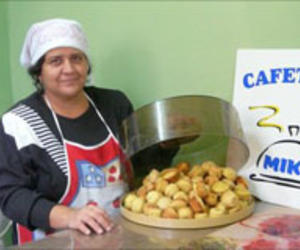Is Cuba set for major changes in 2011?
- Submitted by: manso
- Editorial Articles
- 01 / 04 / 2011

By Michael Voss. Latin America & Caribbean. 2 January 2011 Last updated at 19:39 ET. BBC News, Havana It remains unclear whether Cuba's fledgling private sector will take off or stagnate in 2011. Mirkeyis Calvo used to work in a state-run restaurant. Now she has converted the front room of her suburban Havana home house into "Miky's Cafe".
It is a lunch-time trade. She sells coffee, milk-shakes and sandwiches to people whose heavily subsidised work canteens were closed as part of the government's new cost-cutting measures.
President Raul Castro has announced that 500,000 under-employed state workers will lose their jobs in the coming months.
To help take up the slack, the authorities are in the process of granting 250,000 licences for Cubans to become self-employed or set up small businesses.
Mrs Calvo was one of the first wave of applicants to get permission. But she is heavily taxed and smothered in red tape.
Whether she is still in business by the end of 2011 could be one of the indicators of just how serious the Cuban authorities are about encouraging and developing this fledgling private sector.
The sixth Cuban Communist Party Congress, the first to be held in 14 years, will take place in late April to discuss and ratify what will be the first major overhaul of the island's Soviet-style economic model since the 1960s.
The modest changes announced to date are a long way short of China's free market reforms. Cuba is not about to revert to capitalism but a new class of entrepreneurs and small businessmen will start to emerge.
Younger generation?
Cuba is set for some high-level meetings in 2011 to discuss economic reforms Fidel Castro, who is 84, may have given up the presidency but he remains head of the Communist Party. In July he started re-appearing in public after four years out of the limelight, recuperating from major surgery.
His 79-year-old brother, Raul, has acknowledged that the next Party Congress is likely to be the last one where the generation that led the Cuban revolution half a century ago remains in charge.
President Castro has announced that a separate Party Convention will be held later in the year where the leadership question is expected to be discussed.
Prisoners
Under a breakthrough agreement brokered by the Roman Catholic Church and the Spanish government in July, Raul Castro agreed to release 52 of Cuba's most prominent prisoners of conscience. The majority are now in Spain along with their extended families.
But a dozen of the 52 are refusing to go into exile. So far only one of them has been freed and allowed home,If the remaining prisoners are all released it could pave the way to an easing of relations with Europe and possibly the US.
The European Union is currently reconsidering its position on Cuba in the light of the releases, and has ordered its foreign policy chief, Baroness Ashton, to explore the possibility of improved ties with Cuba.
Cool, not thawed
Cuba's relations with its longstanding nemesis, the United States, have eased marginally under President Barack Obama but further rapprochement in 2011 will be difficult following the Republican Party gains in the US mid-term elections.
One of the most visible signs of the change are the tens of thousands of Cuban-Americans flying into Havana each month to visit relatives.
Under the Bush administration such visits were limited to once every three years. The number of Cuban-Americans making the trip from Miami has quadrupled in just two years to around 300,000. That is expected to jump by up to 30% again in the coming year.
There has also been a flurry of cultural exchanges after the US administration moved to improve "people to people" contacts.
The New York Symphony Orchestra is due to perform in Havana in 2011 following in the footsteps of the American Ballet Theatre and the jazz legend Wynton Marsalis.
US-Cuba cultural links have grown over the past year Several leading Cuban musicians, including Los Van Van and Silvio Rodriguez,have gone the other way across the Straits of Florida and played to US audiences.
But the decades-old trade embargo remains firmly in place. Legislation that would have lifted all restrictions on Americans travelling to Cuba died in December before it could be voted on in Congress.
The new Republican chair of the House Foreign Affairs Committee is Florida congresswoman Ileana Ros-Lehtinen, a prominent Cuban-American strongly opposed to any moves towards weakening US sanctions against Havana.
There was an initial flurry of expectations that these former Cold War adversaries might finally settle their differences, following the changes of leadership in both countries.
Few now expect 2011 to prove the breakthrough year.
Source: http://groups.yahoo.com/group/CubaNews/message/119998
Comments